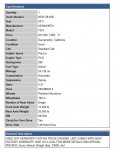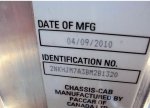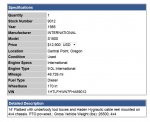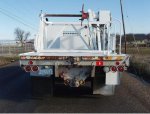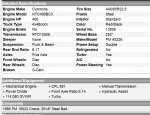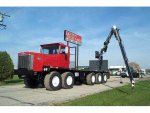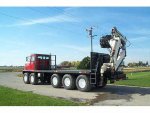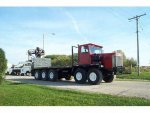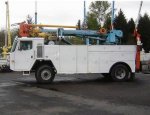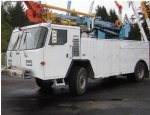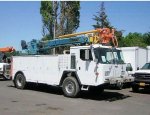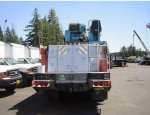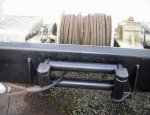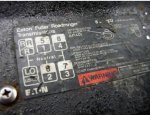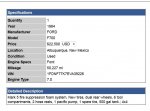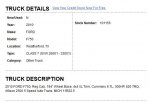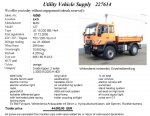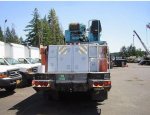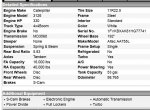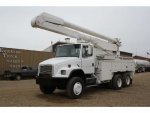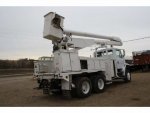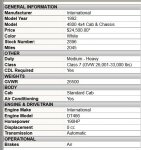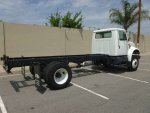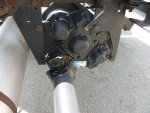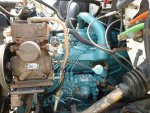In early 2000 Army Acquisition Executive Paul J. Hoeper approved production of modified (A1) versions of the 2�-ton (M1087A1) and 5-ton (M1083A1) trucks after prototypes successfully completed 90,000 miles of testing at Aberdeen Proving Ground, Maryland. This will produce and field a truck with eight times the reliability, availability, and maintainability of the old `deuce-and-a-half' truck it replaces. The new M1087A1 and M1083A1 trucks have more powerful diesel engines, seven-speed automatic transmissions, improved brakes, added corrosion protection, computerized engine diagnostics, and heavy-duty drive-line engine-transmission-differential connections. The trucks also will have more durable seating material and cargo tarps, sturdier door hinges, and reinforced footholds to make it easier to enter the cargo section.
The A1's will be manufactured according to military specifications, but the family of medium tactical vehicles (FMTV) contractor, Stewart and Stevenson, Inc., of Houston, Texas, will use commercial components. This process will enable the Army to purchase more trucks at less cost. The new trucks have been engineered to make them easier to airlift, and some models will be designed specifically for airdrop. According to officials, the Army needs 85,000 new trucks to replace its aging fleet. Soldiers should start receiving the new A1's in March. FMTV trucks issued to Army units since January 1996 will be refitted with stronger U-joints and flywheel housings and larger diameter drive shafts.
The US Army commenced a competition to add a second supplier to build Family of Medium Tactical Vehicles in 1998. Oshkosh Truck Corp. received a $1.9 million contract in November 1998 to compete with one other truck manufacturer to qualify as a second source to produce three trucks for testing by the DoD under Phase I of its second source supplier qualification plan. The three Oshkosh FMTVs produced under this contract have successfully completed Phase I testing. The fiscal year 2000 Defense Authorization Act cancelled the second source program; however, it directed the Army to go forward with a competition for 100% of the next procurement.
Initially, the FMTV competition was scheduled to begin in October 2000 with the issuance of a request for proposal ("RFP") to retrofit three trucks for testing, to be followed by a period of testing, another RFP for firm production pricing and then conclude with a contract award in March or April 2002. In late September 2000, the DoD delayed the competition to permit engine manufacturers more time to develop engines for the FMTV that will be compliant with U.S. Environmental Protection Agency regulations for diesel engines sold in 2004. The DoD's RFP issued in December 2000 requires retrofit of six trucks for testing. The period for follow-on testing and submission of production pricing was extended so that a contract award for production of approximately 14,000 FMTV trucks and trailers was planned by the DoD for the second quarter of fiscal 2003.
In April 2003 the United States Army awarded the Family of Medium Tactical Vehicles (FMTV) A1 Competitive Rebuy production contract to Stewart & Stevenson Tactical Vehicle Systems, LP (TVS), a division of Stewart & Stevenson Services, Inc. (NYSE: SVC). The contract, potentially worth more than $2 billion, was issued by the Army's Tank-automotive and Armament Command (TACOM) and includes production that could reach nearly 11,000 FMTV trucks and trailers over five years, with an option for 12,000 additional vehicles.
Every identified problem in the original A0 model will be fixed in the newer model Al. The manufacturer did a good job of going to the field and talking to soldiers to find out what needs to be done. Noted difficulties aside, the original A0-model FMTV demonstrated more than double the contract-specified reliability requirements for some variants. Those results prompted the Army to almost double the standards for the A1 model FMTVs. The contract required that the A1 operate for 5,500 miles without any hardware failure. During those tests, the vehicles recorded more than 13,000 failure-free miles.
The FMTV A1 series includes a 1999 Environmental Protection Agency-certified engine, upgraded transmission, electronic data bus, an anti-lock brake system and interactive electronic technical manuals.
